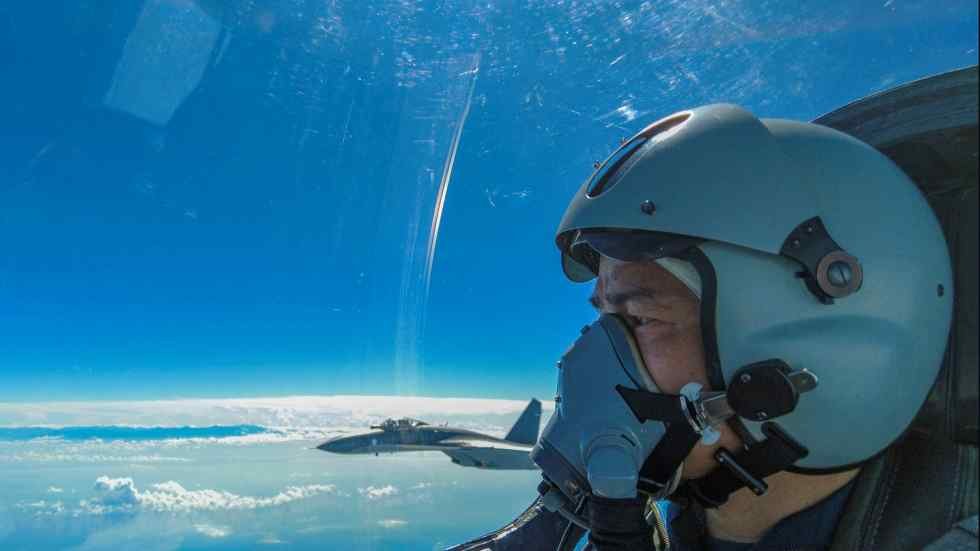China extends threatening military exercises around Taiwan

China has announced Monday it will be extending military drills around Taiwan — a day after the scheduled end of its largest ever exercises, which were conducted in retaliation for last week’s controversial visit to Taipei by House Speaker Nancy Pelosi.
China’s Eastern Theatre Command said it would conduct joint drills focusing on anti-submarine and sea assault operations — confirming the fears of some security analysts and diplomats that Beijing would continue to maintain pressure on Taiwan’s defenses.
Taiwan’s Foreign Ministry headed by Joseph Wu condemned China’s decision to continue military drills, saying the country was still “deliberately creating crises and continues to provoke.”
Wu called on China to immediately stop the threatening exercises and “pull back from the edge,” but also sounded a defiant note.
“In the face of military intimidation created by China, Taiwan will not be afraid nor back down, and will more firmly defend its sovereignty, national security, and free and democratic way of life,” the ministry said in a statement.
Pelosi’s visit to Taiwan last week infuriated China, which regards the self-ruled island as its own and responded with test launches of ballistic missiles over Taipei for the first time, as well as by halting some defense and climate talks with Washington.
The duration and precise location of the latest round of drills is not yet known, but Taiwan has already eased flight restrictions near the six earlier Chinese exercise areas surrounding the island.
Taiwan’s defense ministry said Sunday it detected a total of 66 aircraft and 14 warships conducting the naval and air exercises. The island has responded by putting its military on alert and deploying ships, planes and other assets to monitor Chinese aircraft, ships and drones that are “simulating attacks on the island of Taiwan and our ships at sea.”
Meanwhile, Taiwan’s official Central News Agency reported that Taiwan’s army will conduct live-fire artillery drills in southern Pingtung county on Tuesday and Thursday, in response to the Chinese exercises.
The drills will include snipers, combat vehicles, armored vehicles as well as attack helicopters, said the report, which cited an anonymous source.
Beyond the firing of 11 short-range ballistic missiles during the four earlier days of exercises, Chinese warships, fighter jets and drones maneuvered extensively around the island.
Shortly before those drills ended on Sunday, about 10 warships each from China and Taiwan maneuvered at close quarters around the unofficial median line of the Taiwan Strait, according to a person familiar with the situation who is involved with security planning.
A Chinese state television commentator said late on Sunday that the Chinese military would now conduct “regular” drills on the Taiwan side of the line.
In Taipei, defense ministry spokesman Sun Li-fang told reporters that Taiwan’s armed forces had “calmly” handled the Chinese drills. Earlier, the ministry had said the drills had used warships, aircraft and drones to simulate attacks on the island and its navy.
China’s designated no-fly zones, and crossings of the median line, have “compressed” Taiwan’s training space and will affect the normal operation of international flights and air routes in the future, the ministry said in a statement.
But Chinese foreign ministry spokesman Wang Wenbin said on Monday that China was conducting normal military exercises “in our own waters” in an open, transparent and professional way, adding that Taiwan was part of China.
When asked whether China’s ongoing drills abided by international law and whether new warnings for civilian air and sea traffic would be issued, Wang said relevant departments issued timely announcements in line with both domestic and international law.
China’s defense ministry, meanwhile, maintained its diplomatic pressure on the US, defending its shelving of military-to-military talks in protest at Pelosi’s visit.
“The current tense situation in the Taiwan Strait is entirely provoked and created by the US side on its own initiative, and the US side must bear full responsibility and serious consequences for this,” defense ministry spokesman Wu Qian said in an online post.
“The bottom line cannot be broken, and communication requires sincerity,” Wu said.
China called off formal talks involving theater-level commands, defense policy coordination and military maritime consultations on Friday as Pelosi left the region.
Pentagon, State Department and White House officials condemned the move, describing it as an irresponsible over-reaction.
According to security analysts and diplomats, China’s decision to cut some of its few communication links with the US military raises the risk of an accidental escalation over Taiwan at a critical moment.
One US official noted that Chinese officials had not responded to calls from senior Pentagon officials amid the tensions last week, but that they did not see this as a formal severing of ties with senior figures, such as Defense Secretary Lloyd Austin.
Asked directly about those reports, defense ministry spokesman Wu said, “China’s relevant counter-measures are a necessary warning to the provocations of the United States and Taiwan, and a legitimate defense of national sovereignty and security.”
The Biden administration and Pelosi said the US remains committed to the “one-China” policy that extends formal diplomatic recognition to Beijing while allowing robust informal relations and defense ties with Taipei.
The US, however, criticized Beijing’s actions in the Taiwan Strait, with White House press secretary Karine Jean-Pierre calling them “fundamentally irresponsible.”
“There’s no need and no reason for this escalation,” Jean-Pierre said.
In Washington, Taiwanese de facto ambassador Bi-khim Hsiao said China had no reason to “be so furious” over Pelosi’s visit, which follows a long tradition of American lawmakers visiting Taiwan.
“Well, you know, we have been living under the threat from China for decades,” Hsiao told CBS News on Sunday. “If you have a kid being bullied at school, you don’t say you don’t go to school. You try to find a way to deal with the bully.



